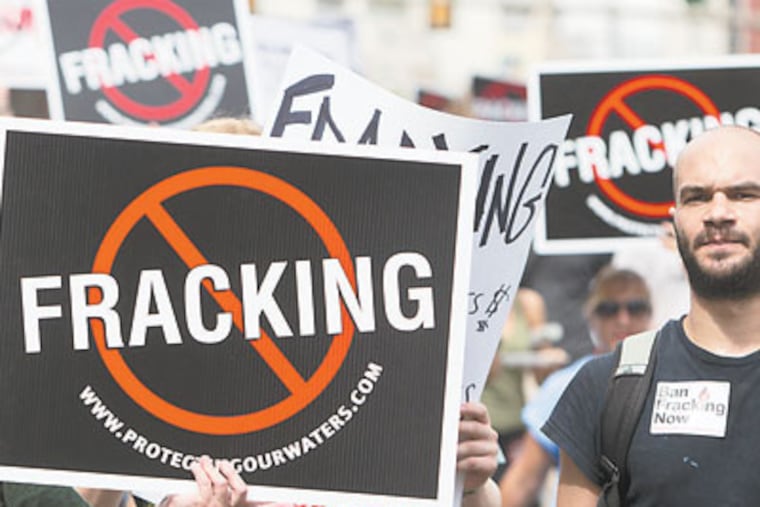Shale-gas industry pros - and protesters - will converge in Philly
The Marcellus Shale natural-gas industry has not exactly enjoyed a warm civic embrace in Philadelphia, where City Council last year famously called for a moratorium on drilling because of environmental worries.

The Marcellus Shale natural-gas industry has not exactly enjoyed a warm civic embrace in Philadelphia, where City Council last year famously called for a moratorium on drilling because of environmental worries.
But the Marcellus Shale Coalition, the industry trade association, will occupy the Convention Center over the next three days to demonstrate that Pennsylvania's shale-gas boom is having economic benefits beyond the rural areas where drilling is taking place.
The coalition's Shale Gas Insight conference, which will attract Gov. Corbett as well as hundreds of protesters, will tout the effect natural gas has had on lowering utility rates, generating jobs, and improving air quality by displacing coal in power generation.
The industry advocates will also highlight the role that abundant supplies of natural gas play in fueling new industrial activity, including the revival of two imperiled refineries in South Philadelphia and Delaware County by lowering their operating costs.
"Shale gas is for real," said Kathryn Z. Klaber, the coalition's president, "and there really is something in it for Southeastern Pennsylvania."
The 2,000 participants at the three-day conference will generate $5.5 million in economic activity for the region, according to the Philadelphia Convention and Visitors Bureau.
That is not counting the economic activity generated by protesters, who are organizing a rally for noon Thursday on Arch Street outside the Convention Center.
The protest, called Shale Gas Outrage, will paint a contrasting portrait of shale-gas development as an economic drain, a health-care nightmare, and a danger to water and air resources.
"It's been really a disaster environmentally in Pennsylvania," said Iris Marie Bloom, head of Protecting Our Waters, an anti-drilling advocacy group that has teamed up with environmental groups to organize its own two-day conference.
The bogeyman for protesters is hydraulic fracturing - "fracking" - the controversial technique for extracting oil and gas from tight shale formations that in the last four years has led to a dramatic reversal of domestic fuel production.
The gas industry points to a recent report by the U.S. Energy Information Administration that credited the switch from coal to natural gas as one of the key reasons behind a 9 percent reduction in greenhouse-gas emissions from 2007 to 2011.
But anti-drilling advocates say the government's estimates fail to account for leaks of methane from drilling, which will speed up climate change. They also say cheap natural gas threatens to displace cleaner, costlier renewable power sources, such as solar and wind.
"The bridge to some clean-energy future is illusory at best," Bill McKibben, the climate-change activist and author, said in a conference call Tuesday. McKibben leads a list of speakers at Thursday's protest, which includes Josh Fox, the star of the influential anti-drilling film Gasland.
Klaber, the industry spokeswoman, said she was puzzled that clean-air activists would object to natural gas, which the industry has been promoting as a replacement for gasoline and diesel as a motor fuel, reducing the nation's dependence on imported oil.
"It does seem somewhat incongruous that so-called environmentalists are protesting the very fuel that's giving us these environmental benefits," she said.
The conference opens Wednesday with a series of technical seminars and ramps up to full speed Thursday before winding down Friday with an address by Jack Welch, the retired chief executive of General Electric Co.
Many of the sessions will address challenges facing the industry - workforce safety, water quality, spill prevention and remediation, and coping with new federal regulations aimed at curbing air emissions from drilling and pipelines.
One session that is likely to explore some of the industry's missteps will focus on public opinion and natural gas in Philadelphia, where some critics say the industry failed to address environmental concerns early on.
"I don't know if I can say they dropped the ball, but they didn't pay much attention," said state Sen. Anthony H. Williams, (D., Phila.), whose wife, Shari Williams, was recently hired by the shale coalition as a communications specialist in Southeast Pennsylvania.
One speaker who is unlikely to lavish the industry with praise is Mayor Nutter, who last year was unable to find time in his schedule to greet the conference. The mayor is scheduled to speak Friday.
Nutter recently wrote to the coalition and called on the industry to agree to fund an early warning system, stream monitoring, and site-restoration bonds before drilling would be allowed to start in the Delaware River Basin, the watershed from which Philadelphia gets much of its drinking water. The Delaware River Basin Commission, a multistate agency, has banned drilling while it considers new regulations.
Said Mark McDonald, Nutter's spokesman: "There is no economic opportunity that is worth jeopardizing our water quality."
For information on the protests: http://www.shalegasoutrage.org.
Contact Andrew Maykuth at amaykuth@phillynews.com or 215-854-2947, or follow on Twitter @Maykuth.